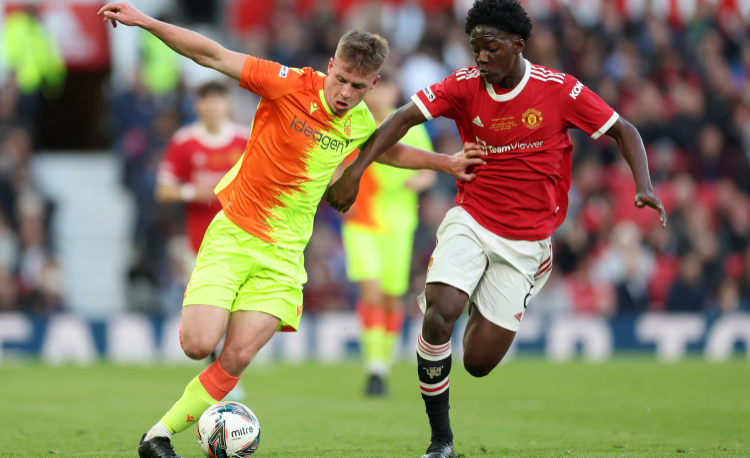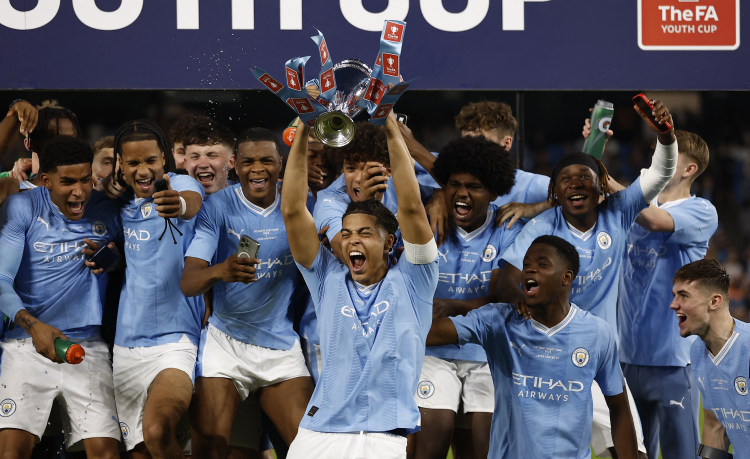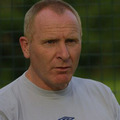You are viewing 1 of your 1 free articles
The ideal academy coach
Working in an academy can be the most enjoyable and most challenging time of any career in the game. John Allpress looks at what a prospective academy coach needs to know
The expectations in the best academies in England can test even the most ambitious practitioners. Here’s why.
Hard work
Most academy groups are jam-packed with talented young footballers. They are energetic, demanding and great fun to work with, and the coach needs to be prepared to work long and hard to match their ambition.
Flexibility
The game is not the teacher. The coach is. Coaching at an academy has to be nimble because it can be a complex undertaking. How the coach goes about their task depends on what they are coaching, the age and ability of the players, the size and mood of the group, the weather, the culture of the club and what it cares about and holds to be true – plus the personality of the coach and the purpose and aims of the work.
Building relationships
Academy players for the most part are razor-sharp. Even the youngest will recognise a lack of knowledge, poor preparation and a slipshod approach: all factors which quickly lose the coach their respect and trust.
Continual learning
Learning the subtle art of coaching and player development never stops, and the structured high-paced nature of the work may not suit everyone.
In academy coaching, you cannot just do your own thing or fly by the seat of your pants. Making it up as you go along is not an option as players don’t get better by accident, they get better by design, and the coach is the designer-in-chief as they should know the players best. If the coach fails to prepare properly the players are let down and they don’t have time for that.
What the academy coach looks like
So what qualities does a good academy coach need? In an ideal world, they will have most or all of these traits and skills within the right club culture.
Creating the learning environment
The academy coach must promote players’ curiosity as well as their eagerness to learn and practice. The environment the coach creates should encourage experimentation and exploration, permit players their mistakes, praise effort and intent, and catch them doing things well. Learning and practice must be front and centre. This does not mean that instruction is obsolete as every type of intervention has a part to play as long as it’s appropriate and useful.
Critical friend, not critical enemy
The coach plays the part of critical friend, not critical enemy, to keep young players grounded and humble without any sense of entitlement. They should always teach to the level of the top players in the group (knowing that top group is liable to change) while supporting the needs of the rest. Focus on golden teaching moments while communicating clearly to the players what to expect from the academy and also what is expected of them as players within it.
Instilling high standards of behaviour
Standards of behaviour in an academy are necessarily high, and players recruited into the training programme have responsibilities as their conduct is always under the spotlight whether they like it or not. Elite behaviours in public involve being kind, humble, respectful and well-mannered, showing people their best side.
Instilling a matchday attitude
On a matchday players need to be tough to beat. It means giving it everything the moment the whistle for kick-off blows, knowing that when you are relaxed and know your job you are more likely to produce a better performance. Toughness means stepping up in the big moments to take a penalty or coming off the bench with a great attitude. It is a large part of the academy coach’s role to promote these excellent and elite behaviours.
Punctuality
Time-keeping will set the tone of any relationship a coach has with their group. If a coach sets a start time the work must start then. Waiting for stragglers is a recipe for disaster as it tells the group the coach does not mean what they say and basically anything goes. The coach can be sympathetic to stragglers and acknowledge their difficulties but never wait for them as it disrespects those players who may have made big sacrifices to be on time.
Emotional intelligence
The best academy coaches are blessed with high emotional intelligence. They have a clarity of purpose and know why their players are there, not to win football matches for their club, but to strive for constant improvement and to go home better versions of themselves.
This can be hard for the coach to reconcile as losing is tough for players of this calibre to take. They have to be made aware that they can learn and practise in a focused deliberate way and the most important part of any matchday or training experience is to review the process to identify what went well, what could be better and what needs to change. The aim is to turn a good performance into a habit and to do this, players must learn to trust the processes involved.
Learning and leading within the club culture
The best academies recruit and surround themselves with well-trained like-minded people, not people who will simply agree with everything. It’s important to fit into the culture but also feel that you can voice an opinion. Good leadership will infect you with the enthusiasm you need to do the job the young players need you to do.
Great teachers have a deep knowledge of their subject, know how people learn and the importance of focused deliberate practice. Know how to move players from not knowing to knowing the topography of the game and how it all works. They know the standards required to survive and thrive in the academy setting and what good play looks like. They are empathetic to players’ needs and always on hand to help them when necessary.
Related Files
Is academy coaching for you?
The academy coach should not be beguiled by results and does not need to worry about winning. Ultimately winning will take care of itself if all the learning and practice bases are covered and everything is done right. It’s important that the coach creates the mood music where young players feel comfortable to get out of their comfort zone, are brave and take risks to try things because even the best of them don’t know how good they can be. It’s important that the players know that their coach would rather they made a mistake than not try anything.
For this formula to work the players must have confidence that the coach has their back while they show the courage and commitment that gives them a fighting chance to get a job in the game and then keep it. If a coach cannot integrate this approach into their teaching philosophy an academy coaching role probably is not right for them. If they can, then it is.
ALL YOU NEED TO KNOW ABOUT ACADEMIES
What is an academy?
An academy is a place for professional football clubs to scout and sign up young, promising players and support them in their development. In English men’s football, they are independently audited and graded in categories, from 1 to 4, with 1 being the best.
What is the Elite Player Performance Plan?
The Elite Player Performance Plan (EPPP) is a long-term strategy in men’s football in England with the aim of developing more and better homegrown players. It was launched in 20212 after consultation between the Premier League and its clubs, representatives of the EFK, the Football Association and other stakeholders, and intends to promote the empowerment of each individual player through a player-led approach.
What is the Performance Pathway?
The Performance Pathway is the route by which young players progress towards professional football. It begins with the Foundation stage (under-9 to under-11), then moves on to Youth Development (under-12 to under-16), before going into Professional Development (under-17 to under-23).
What is the Elite Coaching Plan?
The Elite Coaching Plan (ECP) began in 2020 to support the Elite Player Performance Plan, improving pathways for coaches and to create a world-leading coaching development system in academies and at first-team level.
Editor's Picks
Using the goalkeeper in build-up play
Pressing principles
Intensive boxes drill with goals
Penetrating the final third
Creating and finishing
My philosophy
Pressing initiation
Compact team movement
Defensive organisation
Coaches' Testimonials

Alan Pardew

Arsène Wenger

Brendan Rodgers

Carlos Carvalhal

José Mourinho

Jürgen Klopp

Pep Guardiola

Roy Hodgson

Sir Alex Ferguson

Steven Gerrard
Coaches' Testimonials

Gerald Kearney, Downtown Las Vegas Soccer Club

Paul Butler, Florida, USA

Rick Shields, Springboro, USA

Tony Green, Pierrefonds Titans, Quebec, Canada
Join the world's leading coaches and managers and discover for yourself one of the best kept secrets in coaching. No other training tool on the planet is written or read by the calibre of names you’ll find in Elite Soccer.
In a recent survey 92% of subscribers said Elite Soccer makes them more confident, 89% said it makes them a more effective coach and 91% said it makes them more inspired.
Get Monthly Inspiration
All the latest techniques and approaches
Since 2010 Elite Soccer has given subscribers exclusive insight into the training ground practices of the world’s best coaches. Published in partnership with the League Managers Association we have unparalleled access to the leading lights in the English leagues, as well as a host of international managers.
Elite Soccer exclusively features sessions written by the coaches themselves. There are no observed sessions and no sessions “in the style of”, just first-hand advice delivered direct to you from the coach.







